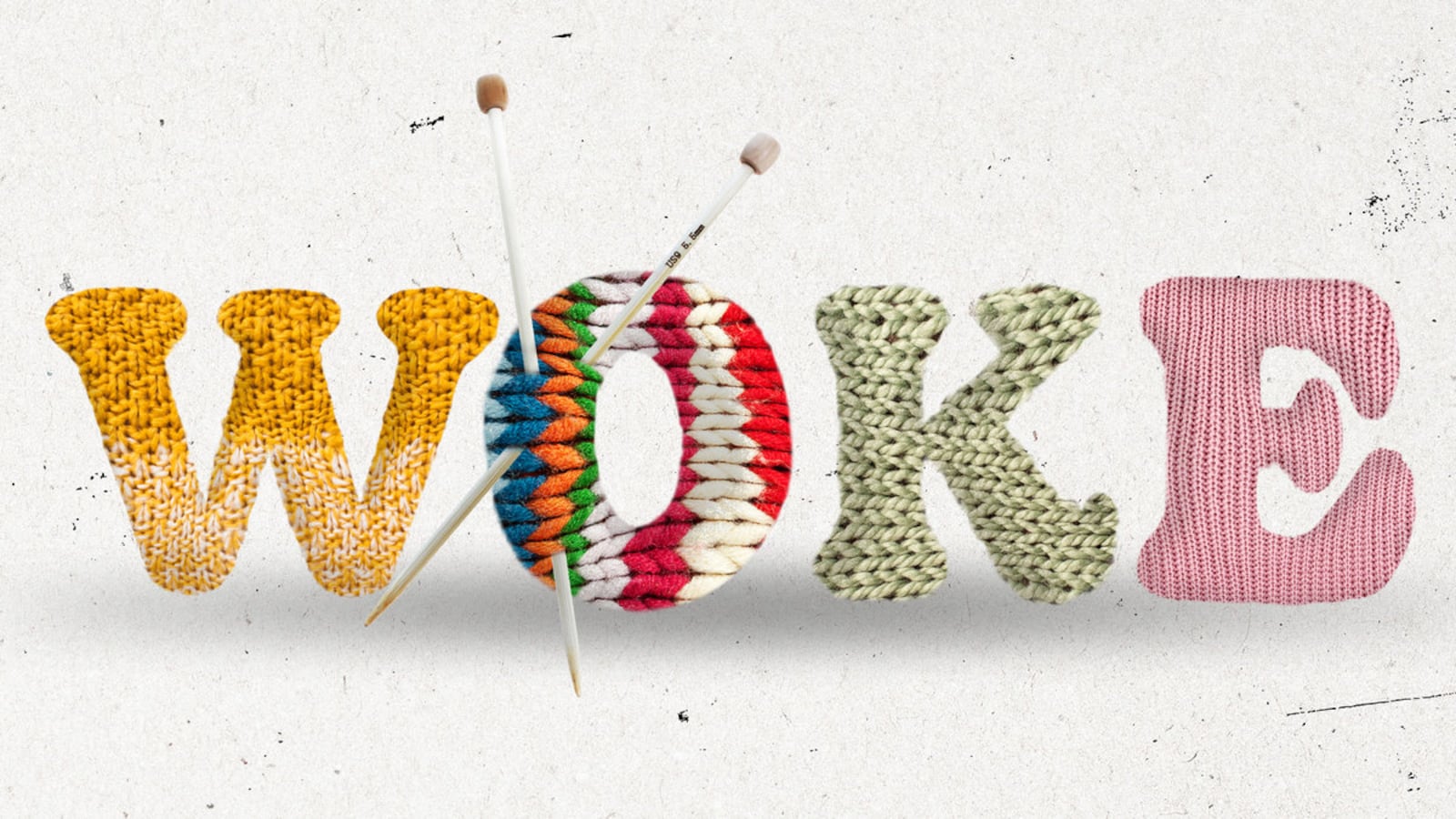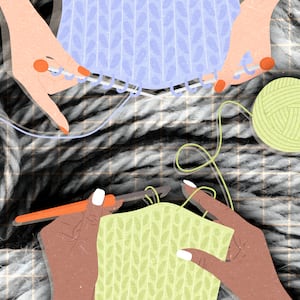Some conservative knitters are so tired of talking about identity politics in the crafting world that they’ve created an entire magazine dedicated to it.
“Blocked,” a new online magazine created by the who’s who of knitting world provocateurs, is a reaction to the anti-racist movement that has swept the country—and by extension, the knitting world—since 2019. In between patterns for crocheted poop emoji and instructions on how to gauge switch, the magazine takes aim at cancel culture, woke “mobs,” and anyone who dares disrupt the knitting status quo.
For those not familiar with this of this nichiest of niches, a refresher: In 2019, a white knitter named Karen Templer wrote a tone-deaf blog post about going to India that sparked a broad social media backlash. (She has since apologized and posted an editor’s note to the article.) Five months later, the knitting social media site Ravelry set off an international shitstorm when it decided to ban all support of Donald Trump, claiming that “support of the Trump administration is undeniably support for white supremacy.” A number of controversies have sprung up from there, including the launch of a line called “PolarizedKnits” and the “cancellation” of white knitting YouTuber Kristy Glass.
Not everyone was happy with this change in mindset, and a few have launched their own rebellions, such as a YouTube channel called “Politically Incorrect Knitters” and a Ravelry alternative called “Freedom Knits.” But none have united this many in a collective effort to—in their words—”be a refuge for those that find themselves cancelled.”
The magazine’s editor, Neil, an English teacher from Manchester, England, told The Daily Beast he started the magazine in direct response to the Kristy Glass incident, in which Glass deleted her channel and locked down her social media after several Black women made videos accusing her of racism. Positioning himself and his contributors as warriors against the angry anti-racists and “bullies-with-pronouns,” Neil wrote in an email: “Sometimes one has to stand up against the mob. That time is now and we are the ones.” (Neil, who declined to give his last name, is active on Instagram; his bio includes the hashtags “#itsoktobewhite,” “#thereareonly2genders,” and “#diversityofthought.”)
Most of the magazine adopts this same aggrieved posture, insisting that the true victims of this culture war are the anti-woke activists who are being “picked off” and “burned as witches.” One article, referring to the day that Ravelry banned Trump content, starts with this incredible sentence: “On June 23, 2019, the fiber community in the United States was torn apart by racism against white, Christian, Republican or otherwise conservative crafters.”
The other stories included in this month's magazine—the first and only issue so far—include a six-page treatise on the Glass incident and a personal essay from the creator of “PolarizedKnits” complaining about the “traumatic scars” she bears from speaking out. There are several cartoons—including one mocking a Finnish publication for suggesting that knitters shouldn’t use the term “Chinese Waitress” to refer to a specific technique—and an open letter to “knitterfluencers” signed: “the blocked and the canceled.”
It’s a lot of complaining about how hard it is to be white and conversative for a magazine that, as Neil put it in his email, was intended to be “an antidote to the nonsense of identity issues.” On page 27, Neil himself pens an entire essay about how much harder male knitters have it than anyone else, which includes gems like, “male knitters and crocheters face far worse rudeness/ridicule than anything I’ve heard a black female knitter talk of,” and, “Black women aren’t told they shouldn’t be knitting or shouldn’t be crocheting. Male knitters/crocheters are told this.”
The magazine ends with a preview of next month’s cover: a black-and-white photo of a woman with yarn wrapped around her mouth—signaling, presumably, her silencing.
The magazine has spurred some outcry in the knitting community. A crocheter named Erin Von Holt posted the names of contributors on Instagram and urged people to unfollow them. A post about the magazine on the “craftsnark” subreddit—which calls the publication “a dumpster fire of cringe”—racked up 266 comments. If the magazine’s Instagram account is to be believed, it has been reported multiple times to both its publisher and to Instagram.
But most of the magazine’s targets seem largely unfazed. Adella Colvin, one of the women who raised concerns about Glass—whom the magazine accuses of something called “Black fragility”—said she has not read the magazine and doesn’t plan on it. Gaye Glasspie, a Black knitting blogger the magazine singles out for attempting to “own the color orange,” had a similar reaction.
In a phone call with The Daily Beast, Glasspie compared the entire publication to teens snubbing their peers in the cafeteria.
“It’s that whole high school stuff of like, ‘You can’t sit at our table, and now we’re gonna make you uncomfortable every time you come in the caf,’” she said. “Well, you shoulda done your homework, I graduated high school in 1984.”
“I’m a grown woman,” she added. “I don’t have time for this mess.”






